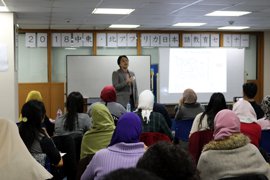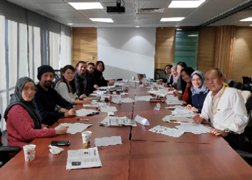Impressions From a Visit to Morocco
The Japan Foundation, Cairo
IIO Koji
Hello everyone. I would like to share with you some impressions from my recent business trip to Morocco.
The region I am responsible for is the Middle East and North Africa, stretching from Morocco in the west to Oman in the east.
My main duties in this region including sending out information via e-mail and SNS, implementing interview surveys, engaging in consulting and counseling work, holding the “Japanese Education Seminar in the Middle East and North Africa” once a year in Cairo, and also going on traveling consultation three to five times a year to provide guidance.

Japanese Education Seminar in the Middle East and North Africa
In FY2018, due to budgetary constraints, I was able to go on three such traveling consultations to provide guidance and training, to Israel, Morocco and the United Arab Emirates (UAE).
The purpose of these trips is to improve the quality of the classes provided by local teachers and create networks by holding study groups and observing lessons, and also to boost the motivation of the Japanese-language teachers.
In this report I would like to touch briefly on the state of Japanese-language education in Morocco.
From 1982 to 2005, the Japan Foundation Japanese-Language Specialist (hereinafter “Specialist”) was dispatched to Mohammed V University in Rabat, but as there were no prospects for the establishment of a Japanese department at the university, the dispatch of Specialists came to an end. Two or three years before the Specialist program was discontinued, a Japanese International Cooperation Agency (hereinafter “JICA”) Senior Volunteer was dispatched, who took over the classes that had until then been taken by the Specialist. Currently Japanese-language education is being provided in the form of public Japanese courses at various universities in addition to Mohammed V University, with a total number of around 700 Japanese-language learners. This is the third-largest figure in my region, after Turkey and Egypt.
As I explained above, the biggest issue with Japanese-language education in Morocco is that despite the fact there are relatively large numbers of Japanese-language learners, initiative is weak on the part of universities. This is not an issue that is unique to Morocco, and is due to the fact that higher educational administrators and university presidents tend to think that they can rely on foreign governments for foreign language education.
Morocco is in just such a situation, with Japanese-language education being left largely in the hands of JICA and Moroccan teachers able to play only an assisting role. This has been causing problems for Moroccan teachers, who have always lacked confidence in their own Japanese language and teaching skills.

Morocco study group
In actual fact, immediately after starting my study group session, I tried my very best to elicit some kind of opinions from a Moroccan teacher by changing my question several times, but they seemed reluctant to answer, and the only responses I received in a subdued voice was, “I think the same,” or “I don’t know.”
However, as the study group session progressed, I felt that the look on the teacher’s face gradually changed, and by the end of the second session they were expressing their own opinions with great confidence.
The day after the study group session, I was delighted to hear that the teacher had suggested to their colleague, a JICA volunteer, that they want to discuss how to proceed with classes.
Although the Moroccan teachers may not be as good as a native Japanese speaker in terms of vocabulary and pronunciation that certainly does not mean that they are inferior in any way as Japanese-language teachers. In addition to the example of the teacher I have just given, among those Moroccan teachers who participated in the study group, there was one who is actively involved in building an online community so that learners can share teaching materials and exchange opinions easily. Despite the fact that they have only been teaching for a few years, they took an online course on general teaching methods and incorporated what they learned in that course into their Japanese classes to make them even better.
These are truly the fruits of the efforts of the Moroccan teachers and the JICA volunteers who support them. My feeling is that giving proper recognition to what Moroccan teachers are doing, and to their very existence, will help to build further motivation and confidence.
In addition to the Moroccan teachers, I have also received feedback from the JICA volunteers, such as, “I was able to get to know how talented the Moroccan teachers are,” and “I’m really glad that we asked all the volunteers to share their opinions in the form of open questions.” In this way, I feel that I have been able to make the interactions smooth between Moroccan and Japanese teachers, and also the JICA volunteers.
I have always thought that the job of a Specialist is to act as just such a “lubricant.” Even if you are the strongest of leaders and get everything up and running smoothly during your term as a Specialist, it will ultimately be meaningless if Japanese-language education in the region where you are dispatched stagnates again after your departure.
I learned various things through my traveling consultation to Morocco. I would like to use this opportunity to express my appreciation to my Moroccan colleagues.
Finally, in the region where I work, there are teachers striving to provide Japanese-language education under harsh conditions that could be described as civil war, in countries like Yemen, Syria and Iraq. I end my report with the prayer that these teachers remain safe and that peace comes to their countries.
- What We Do Top
- Arts and Cultural Exchange [Culture]
- Japanese-Language Education Overseas [Language]
- Japanese-Language Education Overseas [Language] Top
- Learn Japanese-language
- Teach Japanese-language
- Take Japanese-Language Test
- Know about Japanese-language education abroad
- The Japanese-Language Institute, Urawa
- The Japanese-Language Institute, Kansai
- Japanese-Language Programs for Foreign Specified Skilled Worker Candidates
- Japanese Language Education for Japanese Children Resident Overseas and for the Descendants of Migrants
- Archives
- Japanese Studies and Global Partnerships [Dialogue]
- JF digital collection
- Other Programs / Programs to Commemorate Exchange Year
- Awards and Prizes
- Publications
